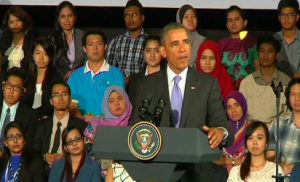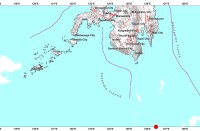
MANILA/KUALA LUMPUR
(Reuters) – The United States and the Philippines have signed a new 10-year security pact on Monday that will allow for a larger U.S. military presence as it struggles to raise its defense capabilities amid territorial disputes with China.
The agreement, which establishes a framework for a beefed-up rotation of U.S. troops, ship and warplanes through the Philippines, was formally sealed just hours before U.S. President Barack Obama arrives in Manila, U.S. and Philippine officials said.
White House officials touted the deal as part of a “rebalancing” of U.S. resources toward the fast-growing Asia-Pacific region.
The Philippines will be Obama’s final stop on a four-country tour aimed at showing sometimes skeptical allies he is serious about the strategic shift.
It comes as China has strengthened its maritime presence in disputed areas in the South China Sea after seizing control of Scarborough Shoal in 2012.
U.S. officials accompanying Obama on a visit to Malaysia insisted the deal was aims to bring greater stability to the region, not at countering Beijing’s growing military assertiveness. “We’re not doing this because of China,” Evan Medeiros, Obama’s top Asia adviser, told reporters.
The accord allows for enhanced “rotational presence” of U.S. forces in the country – but not a return of U.S. military bases, U.S. officials said.
It will allow U.S. forces to train and conduct exercises with Philippine forces for maritime security, disaster assistance and humanitarian aid, the officials said.
The White House said the pact did not specify how many U.S. military assets can be deployed but established a legal basis for deciding on a mission-by-mission basis.
The Philippine Senate voted to evict the U.S. military from their bases in 1991, ending 94 years of American military presence in the Philippines, and has only gradually allowed the return of U.S. forces for limited operations.
RENEWABLE PACT
The Enhanced Defense Cooperation agreement will run for 10 years, shorter than the United States was originally asking for, two Philippine government officials said, asking for anonymity due to lack of authority to reveal details.
But the deal is renewable depending on the needs of the two oldest allies in the Asia-Pacific region, one source said.
It was signed by Philippine Defense Secretary Voltaire Gazmin and U.S. Ambassador Philip Goldberg shortly before Obama met Philippine President Benigno Aquino III in Manila.
The agreement allows the United States to rotate ships, aircraft and troops for a period longer than the current maximum of two weeks during joint military exercises by the two nations, a senior Philippine military source told Reuters.
The United States is expected to gradually deploy combat ships, a squadron of F18s or F16s and maritime surveillance aircraft, the same source said.
Last year, there were 149 U.S. navy ship visits to the Philippines, up from 68 in the previous year, and that number is likely to rise further under the new pact.
“We are considering bases in Northern Luzon like Clark and Subic, and Fort Magsaysay, to accommodate the U.S. forces. We will set aside space in those bases for their troops,” the military source said.
Clark and Subic were bases maintained by the United States northwest of Manila until 1991, when U.S. troops were evicted.
Eight years later, the Senate approved an agreement providing for temporary visits by U.S. forces, allowing the staging of joint military exercises.
The new accord also allows the storage of U.S. humanitarian equipment and supplies for disaster response, with some already in the country after super Typhoon Haiyan devastated central Philippines in November, the military source also said.
Pio Lorenzo Batino, undersecretary of Defense and chair of the Philippine panel negotiating with the United States, earlier said the agreement complied with the Philippine Constitution, which meant U.S. forces will have no permanent presence.
Philippine Senator Miriam Defensor-Santiago said she would scrutinize the pact, adding any agreement involving the posting of foreign troops and equipment required Senate ratification.
While most Filipinos support the pact to help counter China, there is some opposition on the left.
“We condemn in the strongest terms the brazen treachery of the Aquino regime (that has signed) the US-PH Enhanced Defense Cooperation Agreement,” said Renato Reyes of leftist group Bayan (or Nation). “The signing is an obvious gift of a puppet president to his imperialist master.”
(Additional reporting Manny Mogato in Manila, Mark Felsenthal and Stuart Grudgings in Kuala Lumpur; Editing by Alison Williams)






